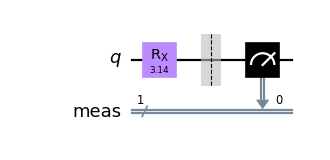Parameter#
- class qiskit.circuit.Parameter(name, uuid=None)[source]#
Bases :
ParameterExpressionParameter Class for variable parameters.
A parameter is a variable value that is not required to be fixed at circuit definition.
Exemples
Construct a variable-rotation X gate using circuit parameters.
from qiskit.circuit import QuantumCircuit, Parameter # create the parameter phi = Parameter('phi') qc = QuantumCircuit(1) # parameterize the rotation qc.rx(phi, 0) qc.draw('mpl') # bind the parameters after circuit to create a bound circuit bc = qc.bind_parameters({phi: 3.14}) bc.measure_all() bc.draw('mpl')


Create a new named
Parameter.- Paramètres:
name – name of the
Parameter, used for visual representation. This can be any unicode string, e.g. « ϕ ».
Attributes
- parameters#
Returns a set of the unbound Parameters in the expression.
Methods
- abs()#
Absolute of a ParameterExpression
- arccos()#
Arccos of a ParameterExpression
- arcsin()#
Arcsin of a ParameterExpression
- arctan()#
Arctan of a ParameterExpression
- assign(parameter, value)#
Assign one parameter to a value, which can either be numeric or another parameter expression.
- Paramètres:
parameter (Parameter) – A parameter in this expression whose value will be updated.
value (ParameterExpression | float) – The new value to bind to.
- Renvoie:
A new expression parameterized by any parameters which were not bound by assignment.
- Type renvoyé:
- bind(parameter_values, allow_unknown_parameters=False)#
Binds the provided set of parameters to their corresponding values.
- Paramètres:
parameter_values (dict) – Mapping of Parameter instances to the numeric value to which they will be bound.
allow_unknown_parameters (bool) – If
False, raises an error ifparameter_valuescontains Parameters in the keys outside those present in the expression. IfTrue, any such parameters are simply ignored.
- Lève:
If parameter_values contains Parameters outside those in self. - If a non-numeric value is passed in parameter_values.
If binding the provided values requires division by zero.
- Renvoie:
A new expression parameterized by any parameters which were not bound by parameter_values.
- Type renvoyé:
- conjugate()#
Return the conjugate.
- Type renvoyé:
- cos()#
Cosine of a ParameterExpression
- exp()#
Exponential of a ParameterExpression
- gradient(param)#
Get the derivative of a parameter expression w.r.t. a specified parameter expression.
- Paramètres:
param (Parameter) – Parameter w.r.t. which we want to take the derivative
- Renvoie:
ParameterExpression representing the gradient of param_expr w.r.t. param or complex or float number
- Type renvoyé:
- is_real()#
Return whether the expression is real
- log()#
Logarithm of a ParameterExpression
- sin()#
Sine of a ParameterExpression
- subs(parameter_map, allow_unknown_parameters=False)[source]#
Substitute self with the corresponding parameter in
parameter_map.
- sympify()#
Return symbolic expression as a raw Sympy or Symengine object.
Symengine is used preferentially; if both are available, the result will always be a
symengineobject. Symengine is a separate library but has integration with Sympy.Note
This is for interoperability only. Qiskit will not accept or work with raw Sympy or Symegine expressions in its parameters, because they do not contain the tracking information used in circuit-parameter binding and assignment.
- tan()#
Tangent of a ParameterExpression